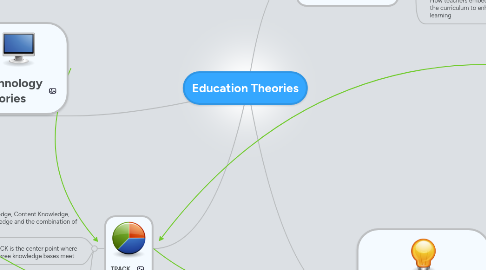
1. Technology Theories
1.1. Media Ecology
1.1.1. Study of Media Environments
1.1.2. Preparadigmatic Science
1.1.3. How media communication affects many domains including human perception, understanding, feelings and value; also relates to how interaction with media can affect our lifestyle
1.2. Social Construction of Technology (SCOT)
1.2.1. Part of the Field of Science & Technology Studies
1.2.2. Human actions shape technology and the development of technology.
1.2.3. Technological Constructivism
1.2.4. Students need to understand how technology fits into social constructs before using technology
1.2.5. Also a methodology that analyzes technological failures or successes.
2. TPACK
2.1. Technology Knowledge, Content Knowledge, Pedagogical Knowledge and the combination of them
2.2. TPACK is the center point where all three knowledge bases meet
2.3. Ideal teaching is a combination of knowledge bases
3. Learning Theories
3.1. Connectivism
3.1.1. Learning theory for the digital age; learning occurs in many different ways including conversations, blogs, emails, reading, web searches. Courses are not the only means of learning new information
3.1.2. Requires actual; learning requires gaining skills and understanding but also putting the knowledge and skills into action
3.1.3. Incorporates two dimensions, thinking and emotions.
3.1.4. Making connections between ideas and concepts is more important that simply understanding concepts.
3.1.5. Uses previous knowledge to construct new knowledge
3.2. Constructivism
3.2.1. Based on learners creating meaning and understanding through experiences and reflecting on those experiences.
3.2.2. Uses previous knowledge to construct new knowledge
3.2.3. Incorporates teachers, students and experts but the learner ultimately takes responsibility for their own learning through discovery.
3.2.4. Collaboration is often used to gain meaning and understanding from others to construct new knowledge
3.3. Cognitive Load
3.3.1. Includes working memory and long term memory
3.3.2. 3 Types: Extraneous Load, Intrinsic Load & Germane Load
3.3.3. Theory explaining the limits of working and long term memory based on human cognitive structures.
3.3.4. Working memory creates schemas of new knowledge that gets imprinted in the long term memory and results in learning
